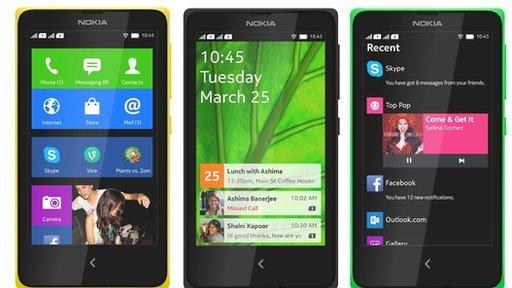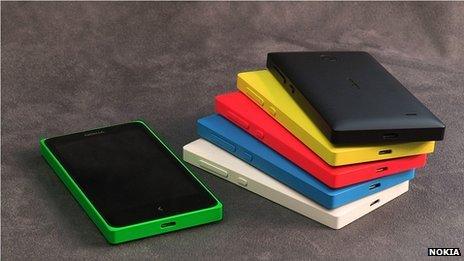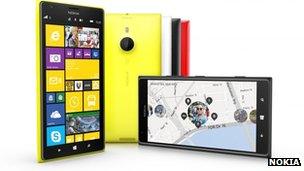Nokia launches first Android phones
- Published
BBC Technology Correspondent Mark Gregory is shown the new X range of Nokia smartphones at the Mobile World Congress in Barcelona
Nokia has unveiled its first family of Android phones at the Mobile World Conference in Barcelona.
The X, X+ and XL will range in price from 89 euros (£74) to 109 euros.
Nokia's most recent suite of smartphones had used the Windows operating system. The announcement had been widely expected despite Microsoft detailing plans to buy Nokia's mobile division at the end of 2013.
Analysts have called the announcement a "perplexing strategic move".
The entry-level X model will feature a 4in (10.2cm) screen with 512MB Ram and a three-megapixel camera. The X+ will have 768MB Ram and a 4GB MicroSD card.

The top-end XL will have a 5in screen, a front-facing two-megapixel camera and a rear five-megapixel camera.
The X will go on sale immediately in several territories including Europe and Asia Pacific. The X+ and XL will launch in April.
Users who buy one of the X models will be able to use Microsoft's free cloud-storage system, OneDrive. The software giant's email software, Outlook, will also ship as standard on all models.
'Bitter pill'
The messaging service BlackBerry Messenger (BBM) will be pre-installed on the phones as will social network Twitter, video app Vine and the game Plants vs. Zombies 2.
More than 1.1 billion devices running Android are expected to ship this year compared with 360 million using the Windows operating system, according to data from research analysts Gartner.
Microsoft agreed to buy Nokia's mobile phone business in a deal worth 5.4bn euros ($7.2bn; £4.6bn).
At the time, the company's then chief executive, Steve Ballmer, called the deal a "big, bold step forward", adding the company was in the process of transforming itself from one that "was known for software and PCs, to a company that focuses on devices and services".
Critics say Microsoft has been too slow to respond to the booming market for mobile devices.

Nokia hopes the phones will appeal to customers in emerging markets
Nokia was once a leader in mobile phones but has struggled in recent years.
The growth area for mobile phone companies is now in emerging markets, where low-cost Android models sell particularly well.
Analysts CCS Insight head of research Ben Wood said: "Nokia was caught between a rock and a hard place.
"Non-participation in the low-cost smartphone market where Android is rampant leaves a lot of money on the table but turning to Android must have been a bitter pill to swallow.
"If you stand back, for a soon-to-be Microsoft-owned company to embrace Android is a perplexing strategic move.
"I believe it was a decision where Nokia felt it had few other options given Android's entry-level dominance in phones and apps, particularly in emerging markets," he added.

Nokia runs Windows on its Lumia range of smartphones
The deal between Microsoft and Nokia has not yet been finalised, and at a Microsoft press conference on Sunday the vice-president of operating systems for Windows, Joe Belfiore, was asked what he thought about Nokia's decision to launch an Android phone.
He replied: "Some things we're excited about, some things we're less excited about. Whatever they do, we're very supportive of them."
Mr Wood believes that despite Monday's announcement Nokia's primary focus remains its Windows phones.
"Given its looming ownership by Microsoft, it will be doing everything it can to get Microsoft to push Windows Phone down to the entry-level smartphone space and will be hoping it's flirtation with Android does not dilute this," he said.
Nokia's senior vice president Stephen Elop confirmed that the Lumia remains "our primary smartphone platform" and that the X range would be used as a "feeder system",
- Published3 September 2013
- Published3 September 2013
- Published23 February 2014